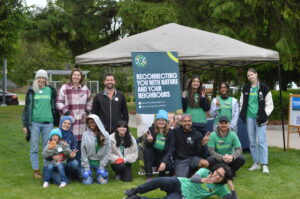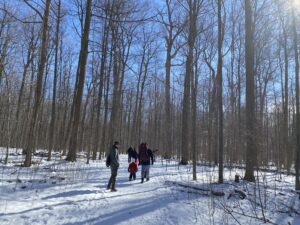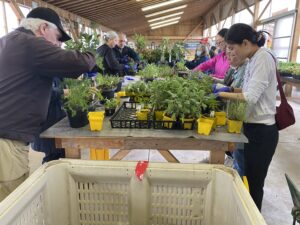The Reconnection Project
Projects Sponsor
Launched in 2024, Environmental Defence Canada’s Reconnection Project works to generate public engagement on environmental issues at the community level and build connections with local residents through conversations and events. Already active in eight regions surrounding the GTHA, where they hold year-round community-based events, the Reconnection Project’s in-person, in-nature outreach and series of educational guides and social media content have amassed an active supporter base of 18000 Ontarians. By fostering people’s interest in natur EDC 03 Reconnection Project Brampton Hiking Guide Cover Page e, enabling them to forge connections within their communities and participate in civic action, Environmental Defence Canada’s Reconnection Project turns love of nature into action for nature.
A 2024 national survey conducted by EcoAnalytics, a Canadian environmental research initiative, identified a considerable segment of the Canadian population—the Civic Nationals—who are walking the nature walks but not talking the nature conservation talk. While this demographic expressed strong connections to nature and prioritized the wellbeing of their communities, these values were not inspiring them to mobilize and organize to nurture and protect that which was clearly meaningful to them.
These traits are notably different from the typical environmental action supporter which makes this segment of the population just beyond the reach of environmental NGOs, including Environmental Defence Canada (EDC).
 Recognizing the necessity and opportunity to expand EDC’s audience beyond its usual supporter demographic, The Reconnection Project was conceived to engage and activate those people with an affinity for nature not currently partaking in environmental advocacy or exhibiting any interest in civic engagement.
Recognizing the necessity and opportunity to expand EDC’s audience beyond its usual supporter demographic, The Reconnection Project was conceived to engage and activate those people with an affinity for nature not currently partaking in environmental advocacy or exhibiting any interest in civic engagement.
In Ontario, it was estimated that Civic Nationals represent 21% of the population—characterized by their connection to community, love for nature, dislike for misinformation/disinformation and yet lack of participation in civic engagement—suggesting significant potential for EDC to expand its audience and grow a strong supporter base.
The need for a bigger environmental advocacy tent was clear, and by increasing civic engagement on environmental issues and by fostering people’s interest in nature through community events and educational content, EDC hoped to pitch that larger tent, tidy the campsite and effect the discourse around the fire.
In 2024 the project was launched in three regions: Brampton, Durham and York Region. Local project coordinator and outreach team members in each region were hired to help establish a community presence. Their ambitious target was to acquire 10,000 new supporters across all regions using customized resources and educational materials, and engagement tactics such as community in-person and virtual events.
 Now in year two, the EDC team expanded the project into five more regions—Burlington, Hamilton, Oakville, Mississauga, and Waterloo—using tactics that are continually refined to reach and motivate the maximum number of nature-loving, concerned residents. Ultimately EDC aims to grow their supporter base to over 30000 Ontarians, inspiring and mobilizing at least 30% to take at least one action by the end of the project but honing their strategy to achieve that end has been a learning experience.
Now in year two, the EDC team expanded the project into five more regions—Burlington, Hamilton, Oakville, Mississauga, and Waterloo—using tactics that are continually refined to reach and motivate the maximum number of nature-loving, concerned residents. Ultimately EDC aims to grow their supporter base to over 30000 Ontarians, inspiring and mobilizing at least 30% to take at least one action by the end of the project but honing their strategy to achieve that end has been a learning experience.
Engaging community members in non-virtual settings (i.e. securing high turn-out at community events) to start meaningful conversations and building connections within the community was a challenge. There were indeed several instances where planned in-person events resulted in somewhat disappointing attendance, given the high registration numbers. Reflecting on the lessons learned, various event setups (i.e. day of week, time of day, location, etc.) were tested and a modest improvement in event turnout has been achieved.
In contrast, the Reconnection Project’s virtual events were consistently well attended. The team has since speculated that the inconsistent performance could be due to the most Canadian of external factors—the weather.
 Community EDC events continue, as does the gathering of participant feedback which will be used to fine-tune future event programming. Entirely new community engagement tactics have been developed including a volunteer program to engage high school students as ambassadors for The Reconnection Program in their community, offering them an opportunity to learn more about environmental protection and civic engagement. A Community Stewards initiative now encourages the group’s more active supporters to develop small-scale time-bound projects in their community, foster neighbourhood connections and help protect their environment.
Community EDC events continue, as does the gathering of participant feedback which will be used to fine-tune future event programming. Entirely new community engagement tactics have been developed including a volunteer program to engage high school students as ambassadors for The Reconnection Program in their community, offering them an opportunity to learn more about environmental protection and civic engagement. A Community Stewards initiative now encourages the group’s more active supporters to develop small-scale time-bound projects in their community, foster neighbourhood connections and help protect their environment.
Currently active in eight regions around the Greater Toronto and Hamilton Area (GTHA) – Brampton, Burlington, Durham, Hamilton, Mississauga, Oakville, Waterloo and York Regions, with a combined subscriber list of 18000 community members, EDC’s unique but highly replicable approach offers practical inspiration. The project has been a testing ground for EDC’s theory that building connections within communities around shared values and, through education and support, activates previously unengaged people to partake in the policy advocacy desperately needed to conserve the environment they love. The intentionally flexible and localized program design invites like-minded ENGOs and community groups to spark engagement further afield, (and forest and ravine!).
 Leveraging the interests and issues people already feel passionate about to engage and subsequently activate a sizable segment of the Canadian population that is usually not interested nor involved in civic and environmental advocacy, opens the door to informing people about broader relevant environmental issues that may not have been on their busy, daily horizons. It’s educational programming that’s turning knowledge into the kind of action we urgently need.
Leveraging the interests and issues people already feel passionate about to engage and subsequently activate a sizable segment of the Canadian population that is usually not interested nor involved in civic and environmental advocacy, opens the door to informing people about broader relevant environmental issues that may not have been on their busy, daily horizons. It’s educational programming that’s turning knowledge into the kind of action we urgently need.













